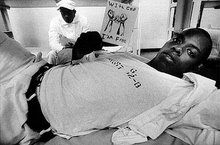 Jaydee Hanson said ...
Jaydee Hanson said ... The safety of meat and milk from clones is unproven. The FDA approved food from cloned cows, pigs and goats after reviewing very few and small studies. The largest study (on cloned cows' milk) used only 15 animals but found significant differences in cloned animals' milk. Get in on the Debate! Sound off! Share your opinions about the safety of meat from cloned animals in the comments section below.
The safety of meat and milk from clones is unproven. The FDA approved food from cloned cows, pigs and goats after reviewing very few and small studies. The largest study (on cloned cows' milk) used only 15 animals but found significant differences in cloned animals' milk. Get in on the Debate! Sound off! Share your opinions about the safety of meat from cloned animals in the comments section below. Only one study assessed the toxicity of cloned products: Twenty rats ate meat and milk from clones for 14 weeks. The rats had significant immune-system changes.
Only one study assessed the toxicity of cloned products: Twenty rats ate meat and milk from clones for 14 weeks. The rats had significant immune-system changes. Most beef studies found differences in clones' meat composition; both pork studies found significant differences. These small sample sizes would not be adequate to assess a new drug; they cannot assure the safety of meat or milk from clones.
Nevertheless, at the end of the Bush administration, the FDA hurriedly approved clones. Most clones die before birth or in the first few weeks of life. Cattle clones often suffer "large-offspring" syndrome, wherein the fetus grows twice as large as normal, sometimes causing death for both the cow and calf.
The surviving calves are often sicker than ordinary calves. Some studies found that defects in clones could pass down to offspring. The data on cloned pigs' offspring display troubling findings: smaller litters, slower growth, 25 percent of progeny dying, and an abnormality rate two-and-a-half times that of normal pigs.
















































































































1 comment:
Also, don't forget the fact that there exists a possibility that non-genetically altered animals/plants can potentially be permanently and irrevocably damaged by contamination from genetically altered sources. (I.E. a genetically altered plant being cross pollinated with a regular one, or a cloned pig breeds with a non-cloned one.)
Skeptics might say there's little to no possibility of this happening because the people who run these companies keep strict control of their inventories and are careful to keep the two groups separated.
Just like our government keeps strict control of things like uranium or nuclear warheads
Post a Comment